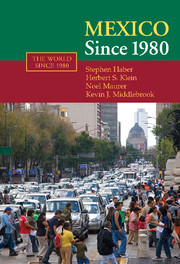Book contents
- Frontmatter
- Contents
- List of Figures
- Acknowledgments
- Abbreviations and Acronyms
- 1 The Second Mexican Revolution: Economic, Political, and Social Change Since 1980
- 2 Mexico Before 1982: The Political Economy of Authoritarian Rule
- 3 The Causes and Consequences of Free Trade
- 4 The Mexican Banking System: The Politics and Economics of Financial Underdevelopment
- 5 The Transformation of Mexican Politics
- 6 Health, Education, and Welfare in Mexico Since 1980
- 7 Democracy and Development in Mexico: Future Challenges and the Legacies of Authoritarian Rule
- Bibliography
- Index
5 - The Transformation of Mexican Politics
Published online by Cambridge University Press: 05 September 2012
- Frontmatter
- Contents
- List of Figures
- Acknowledgments
- Abbreviations and Acronyms
- 1 The Second Mexican Revolution: Economic, Political, and Social Change Since 1980
- 2 Mexico Before 1982: The Political Economy of Authoritarian Rule
- 3 The Causes and Consequences of Free Trade
- 4 The Mexican Banking System: The Politics and Economics of Financial Underdevelopment
- 5 The Transformation of Mexican Politics
- 6 Health, Education, and Welfare in Mexico Since 1980
- 7 Democracy and Development in Mexico: Future Challenges and the Legacies of Authoritarian Rule
- Bibliography
- Index
Summary
The Institutional Revolutionary Party (PRI) paid a substantial political cost for the poor performance of the Mexican economy during much of the 1980s and 1990s. The party had legitimated its monopoly on electoral office in part by portraying itself as the architect of an “economic miracle” that had, over a span of several decades, industrialized the country and generated rising standards of living. As we discussed in Chapter Two, these claims had always been overstated. But more than a decade of recurrent financial crises and slow economic growth gradually undermined whatever validity they had. For the first time in its history, the PRI began to face serious competition from opposition forces on both the right and the left of the political spectrum.
There was nothing inevitable about the process by which Mexico democratized. In fact, progress toward electoral democracy in Mexico was gradual and halting. It is certainly true that long-term changes in Mexican society – increasing urbanization, the growth of an educated middle class, and the emergence of groups of students and intellectuals who were not easily co-opted – posed a challenge to Mexico's ruling party from the 1960s onward. These factors alone, however, cannot explain the PRI's eventual loss of national power. Electoral democratization owed as much – or more – to contingent economic and political developments.
Ironically, some of the strategies that PRI-led administrations adopted to forestall economic collapse, or to rekindle economic growth, undermined the coalition that had long supported the party's monopoly on power.
- Type
- Chapter
- Information
- Mexico since 1980 , pp. 123 - 160Publisher: Cambridge University PressPrint publication year: 2008

